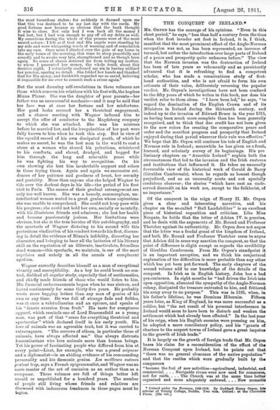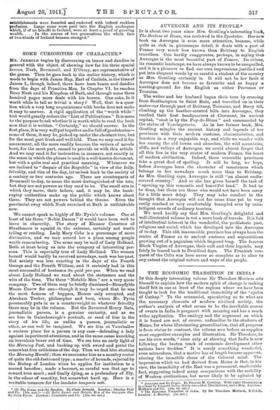THE CONQUEST OF IRELAND.*
MR. ORPEN has the courage of his opinions. "Even in this short period," he says, " less than half a century from the time when the first invader set foot in Ireland, it is, I think, manifest that the most prominent effect of the Anglo-Norman occupation was not, as has been represented, an increase of turmoil, but rather the introduction over large parts of Ireland of a peace and prosperity quite unknown before." The view that the Norman invasion was the destruction of Ireland has been of late years so vehemently and so persistently advanced that it is refreshing to find a competent scholar, who has made a conscientious study of first- hand authorities, and who is not afraid to form his own estimate of their value, deliberately reversing the popular verdict. Mr. Orpen's investigations have not been confined to the fifty years of which he writes in this book, nor does his verdict refer to them alone. "I have been led," he says, " to regard the domination of the English Crown and of its Ministers in Ireland during the thirteenth century, and indeed up to the invasion of Edward Bruce in the year 1315, as having been much more complete than has been generally recognized, and to think that due credit has not been given to the new rulers for creating the comparative peace and order and the manifest progress and prosperity that Ireland enjoyed during that period wherever their rule was effective." We hope that Mr. Orpen will continue his tale of English and Norman rule in Ireland; meanwhile he has given us a fresh, learned, and scholarly survey of its beginnings. His pro liminary chapters on "Anarchic Ireland" explain both the circumstances that led to the invasion and the Irish customs and institutions that influenced it. He takes an unusually favourable view of the historical work of Gerald de Barry (Giraldus Cambrensis), whom be regards as honest though prejudiced, and as an unusually acute and not specially credulous observer; the stories "which have cast an unde- served discredit on his work are, except to the folklorist, of no importance."
Of the conquest in the reign of Henry II. Mr. Orpen gives a clear and interesting narrative, and his chapter on the so-called " Bull Laudabiliter " is an excellent piece of historical exposition and criticism. Like Miss Norgate, he holds that the letter of Adrian IV. is genuine, and he deals with the arguments of Mr. Round and Professor Thatcher against its authenticity. Mr. Orpen does not argue that the letter was a feudal grant of the kingdom of Ireland, and both Mr. Round and Professor Thatcher seem to argue that Adrian did in some way sanction the conquest, so that the point of difference is slight except as regards the credibility of Giraldus Cambrensis. From Mr. Orpen's standpoint it is an important exception, and we think his conjectural explanation of the difficulties is more probable than any other which has yet been put forward. The early chapters of the second volume add to our knowledge of the details of the conquest. In Irish as in English history, John has a bad pre-eminence. In eight months he " had driven the Irish into open opposition, alienated the sympathy of the Anglo-Norman colony, dissipated the treasure entrusted to him, and frittered his army away to no purpose." This was in 1185, when, in
his father's lifetime, he was Dominus Hibernim. Fifteen years later, as King of England, he was more successful as a soldier, but " the net result of his personal interference in Ireland would seem to have been to disturb and weaken the settlement which had already been effected." In the last year of his reign, when his English enemies were pressing on him, he adopted a more conciliatory policy, and his "grants of charters to the seaport towns of Ireland gave a great impetus to the growth of Irish trade."
It is largely on the growth of foreign trade that Mr. Orpen bases his claim for a reconsideration of the effect of the Norman Conquest upon Ireland, but he points out that " there was no general clearance of the native population" and that the castles which were gradually built by the conquerors
"became the foci of new activities—agricultural, industrial, and commercial. . . . Navigable rivers were now used for commerce, not for raids. . . . The Church was at the same time better organized and more adequately endowed. . . . New monastic; • Ireland under tits Normans, 1169-1216. By Goddard Orpen, late scholar of Trinity College, Dublin. Two vols. Oxford:Riie'tnVie Clarendon Press. [2Ia net.] e stablishments were founded and endowed with indeed reckless profusion. Large sums were paid into the English exchequer which, if of no benefit to Ireland, were at least a proof of growing wealth. . . . In the course of two generations the whole face of two-thirds of Ireland became changed."



































 Previous page
Previous page